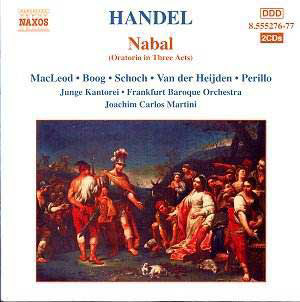You doubtless wonít be alone in not having heard of
Nabal, a three act Handelian oratorio first performed five years
after the composerís death. It is not an original work by him at all
but rather one of the many examples of pasticcio, in which a
composite work is constructed through the use of excerpts from other
works or indeed other composersí works. In Nabalís case the conduit
was the eminently practical John Christopher Smith, son of Handelís
principal copyist, who had, when a boy of twelve, taken harpsichord
lessons from Handel. In 1750 Smith helped the ailing composer with performances
of his oratorios and was himself a valued musician, being organist and
choirmaster at the Foundling Hospital. After Handelís death he led an
annual performance of Messiah in his memory and subsequently
went on to work with Garrick, collaborating on three operas together.
The pasticcio suited eighteenth century entrepreneurial
spirit very nicely; it satisfied the continued thirst for oratorio rendered
problematic by the unavoidable absence of the formís principal producer
in London. Handelís death certainly didnít spell the end of Handelian
oratorio. The enterprising Smith, after a period of retrenchment and
manuscript searching, joined up with Thomas Morell to create new works
Ė Rebecca and Nabal were the first fruits of their collaboration
and both had their premieres on 16th March 1764. Nabal received
a further performance five days later but itís likely that it has never
been heard since, at least not publicly. Morell had written the libretti
for some of Handelís greatest works Ė Judas Maccabaeus, Theodora,
Jeptha and others Ė and he wrote a text drawn from Samuel 1:25,
one that fitted pre-existing music from a wide variety of source material:
operas, oratorios, anthems and cantatas. The recitatives are probably
the work of Smith himself. The booklet covers very well the attribution
of source material noting, where known, the original work from which
Smith derived the music and upon which Morellís new text was grafted.
In this kind of work one is constantly dimly aware of a half recognised
melody - and in the light of Handelís own borrowings and self-borrowings
the sense of absorption, digestion and renewal takes on a new form.
The performance is neat and conscientious, sometimes
more. Tenor Knut Schochís English is strongly accented and he has a
rather hollow quality to his tone and nothing glamorous about it. He
makes a real meal of the runs in the Third Part air Lovely beauty,
and struggles with the top of his voice here and elsewhere. But
he is an intelligent and understanding musician. Francine van der Heijden
has a sure instinct for Handelian line, great clarity and security of
register Ė I particularly admired her negotiation of the air The
lord, our guide derived from Muzio Scevola; a fine and valuable
voice for the Baroque literature. As for Nabal himself Stephan MacLeod
has a notably well modulated bass though one that can tend to bark
in the higher register Ė as he does in Still fill the bowl. Linda
Perillo, as the shepherd, is a playful and dramatically inclined soprano
but her production is uneven and can tend toward the erratic; in her
aria Gay and light as yonder sheep she negotiates her divisions
reasonably well but at 1í22 engages in some not especially attractive
gurgling. By contrast she is much more effective and successful, dramatically
and musically, when floating her voice. She is a most interesting singer
and itís to be hoped that something can be done to sort out her register
breaks. The choir sounds rather distant and diffuse; occasionally individual
voices can be heard, strands not ideally blended. The small orchestra
meanwhile is spirited and alert - nice string articulation in the instrumental
gavotte of the First Part Ė and take sensible tempi directed by Joachim
Carlos Martini though to my ears the chorus By slow degrees the wrath
of God is not well sustained at this slow tempo. Nevertheless this
is an honourable presentation of a work, the problematical and artificial
nature of which means that recordings will be few and far between.
Jonathan Woolf


